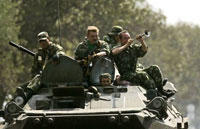Long Live Western Lies!
The first anniversary of the war in South Ossetia has become the main topic of the week for the Western media. However, most articles can be characterized as anti-Russian as they were a year ago.

At the same time one has to say to say that, presently, Western journalists accuse Russia of attacking Georgia much less, than they did before. Moreover, they do not glorify and justify Georgian President Mikhail Saakashvili.
The article, which has recently been published in The Los Angeles Times under the title “Year later, Russia's victory over Georgia cuts both ways” can be a good example of that.
On the one hand, the author of the article tries to prove, that Russia has found itself in isolation. “Last August, fresh off a swift, decisive military victory over U.S.-backed Georgia, the Kremlin basked in newfound international power and domestic prestige … One year later, the euphoria has evaporated. The war is still discussed in tones of righteousness, but the military victory left Russia isolated made formerly compliant neighbors reluctant to do Moscow's bidding,” the newspaper wrote.
At the same time, journalists did not claim that it was Russia that attacked Georgia, though Saakashvili was not called the offender. “The exact circumstances of the war's onset remain in dispute, but the most commonly held version of events is that Georgia launched a military operation to reassert control over the rebel province of South Ossetia, and Russia invaded, fighting on the side of the separatists,” the article said.
“In Georgia, the U.S.-backed leadership has been left to grapple with the painful reality of lost lands and shattered military infrastructure. Political instability intensified this year as massive demonstrations demanded Saakashvili's resignation, pointing to the war as evidence of his insufficiency,” the article says.
The New York Times also published an article about the war titled “Georgia. A year after” on August, 6th. Its authors do not sympathize with Russia. However, they declare that there is no necessity to idealize Georgia either.
“In the year since the war between Russia and Georgia, it has become clear that in addition to the vague intention of resetting U.S. relations with Russia, Washington must develop distinct policies for Georgia.
“While Georgia has indeed been a friend to America, demonstrating this by sending troops to Iraq and Afghanistan, it is certainly not a pure democracy. Yet this is how Georgia generally has been viewed by the Obama and Bush administrations. This was especially true during the war with Russia, when Georgia was often simplistically touted as the democratic David battling the authoritarian Russian Goliath,” the newspaper wrote.
“United States must make clear to Tbilisi that — while it understands that Russia is a difficult neighbor — Washington has higher standards for its allies and will no longer accept empty promises of democratic advancement,” The New York Times wrote.
Several French newspapers gave the floor to the Georgian authorities and the latter used the opportunity to portray Russia as the aggressor.
For example, Le Monde newspaper published the interview with Georgian President, Mikhail Saakashvili and La Croix interviewed Georgia’s Minister for Foreign Affairs Ekaterina Tkeshelashvili.
However, Le Monde at the same time neutrally described the telephone conversation between the American Vice-President and the Georgian President.
“The American vice-president Biden called Georgian President Mikhail Saakashvili and expressed concern over the recent escalation in tensions and emphasized that all parties should avoid destabilizing actions,” the newspaper reported.
The German print media also paid attention to the anniversary of the Caucasian war. The Financial Times Deutschland newspaper published the article titled “Russia rattles the sabre in South Ossetia”. The article interpreted the recent provocations in the region from the anti-Russian point of view.
Another German newspaper, Frankfurter Rundschau, accused Russia of not sending the troops to South Ossetia prior to the military action.
At the same time, the author of the article accused his colleagues of presenting the events non-objectively.
Polish publications also attacked Russia, while writing about the anniversary of the conflict. For example, a weekly Polish newsmagazine compared Russia to a growling bear, demonstrating that it would not let anybody claim its sphere of influence.
South Ossetian politicians and Russian political analysts are outraged by the Western publications.
Inal Pliev, Assistant to the President of the Republic of South Ossetia, said that the publications in the Western media about the conflict were outrageous.
“The Western mass media ignored the major principle of journalism during Georgia’s invasion in South Ossetia - to speak the truth. They completely discredited themselves.
Many people in the West know, that their journalists lied about the war in Yugoslavia, about the war in Iraq and about the war in South Ossetia.
Most articles published by the Western media do not contain a single piece of truth. They only were published to abuse and humiliate Russia.
Vadim Trukhachev
Pravda.Ru
Also read: South Ossetia - What if...
Subscribe to Pravda.Ru Telegram channel, Facebook, RSS!




